英语语法:助动词、情态动词
中学英语语法助动词与情态动词
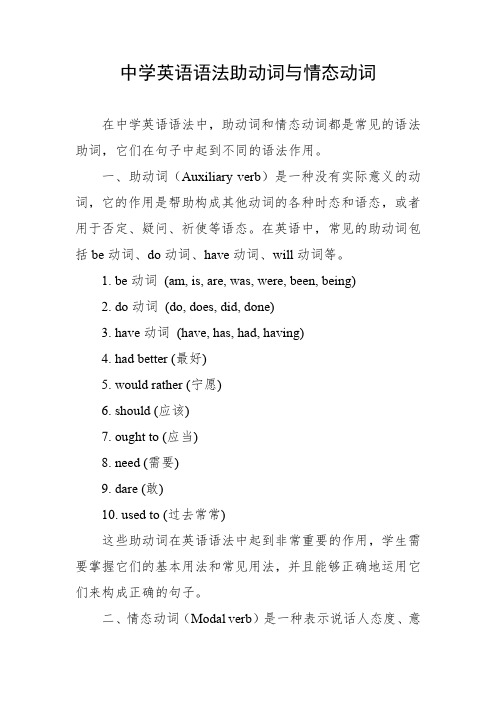
中学英语语法助动词与情态动词在中学英语语法中,助动词和情态动词都是常见的语法助词,它们在句子中起到不同的语法作用。
一、助动词(Auxiliary verb)是一种没有实际意义的动词,它的作用是帮助构成其他动词的各种时态和语态,或者用于否定、疑问、祈使等语态。
在英语中,常见的助动词包括be动词、do动词、have动词、will动词等。
1. be动词(am, is, are, was, were, been, being)2. do动词(do, does, did, done)3. have动词(have, has, had, having)4. had better (最好)5. would rather (宁愿)6. should (应该)7. ought to (应当)8. need (需要)9. dare (敢)10. used to (过去常常)这些助动词在英语语法中起到非常重要的作用,学生需要掌握它们的基本用法和常见用法,并且能够正确地运用它们来构成正确的句子。
二、情态动词(Modal verb)是一种表示说话人态度、意愿、推测、能力等的动词,它们通常用于表示说话人的主观态度或对某个行为的看法。
在英语中,常见的情态动词包括can、could、may、might、shall、should、will、would等。
情态动词是英语语法中的一类特殊动词,它们用于表达说话人的态度、意愿、推测、能力等。
情态动词通常不单独使用,而是和实义动词一起构成谓语动词,用于表达各种语态和时态。
以下是一些常见的英语语法情态动词:1. can (能够)2. could (过去能够)3. may (可能)4. might (可能)5. shall (将要)6. should (应该)7. will (将会)8. would (会)9. must (必须)10. need (需要)11. dare (敢)12. used to (过去常常)情态动词的使用可以表达说话人对某种情况或行为的看法、意愿、推测、能力等,因此在英语语法中非常重要。
高考英语助动词情态动词

时。
2) 构成完成进行时态:have + been + v-ing
3) 构成不定式等非谓语动词的完成式:have+p.p./ having+p.p.等。
3. do
1) 构成疑问/否定。
2) 用于强调动词:I did do it yesterday.
3) 用于代替上文中刚提及的动作,以避免重复:He lives here but I
人教版高中英语总复习
助动词和情态动词 讲课教师 郑士国
助动词和情态动词—用法决定词性
助动词和情态动词 均为辅助动词表达意义的动词。
1. 助动词用于表示人称、时态和语态
1) be, have, do
2) shall/should, will/would (兼做情态动词)
2. 情态动词 用于表明作者要赋予动词的情态意义。
1) must, may/might
2) shall/should, would, ought,
3) need, dare, have, used, be able, had better/had best
情态动词 准确把握句子的语气, 是正确使用情态动词的要点和难点。 无论是揣摩别人的语气,还是表达自己的语气,都需要清晰分辨语境中 情态动词的含义。
进行时。
3) 构成被动语态 be + p.p.
助动词—时态和语态的承载者
2
2. have
1) 构成完成时态:have + done
A. 当have为have/has时,与不同的人称和数的主语配合,构成现
在完成时。
B. 当have为had时,与不同的人称和数的主语配合,构成过去完成
第004章助动词和情态动词

第四章助动词和情态动词助动词和情态动词都是动词的不同形式,不能单独使用,通常和谓语中心词一起构成谓语动词的各种时态,语态及其他用法。
第一节助动词一、助动词的种类英语中的助动词有四种:(1)be(is, am, are, was, were, being, been )(2)have(has, had, having)(3)do(does, did)(4)shall, will(should, would)二、助动词的用法助动词本身没有独立的词义,不能单独构成谓语,通常和谓语动词连用表示时态、语态、语气或构成否定句和疑问句。
1、构成除一般现在时和一般过去时之外的各种时态。
例如:she is having a meeting.她在开会。
I shall help you any minute.我将随时帮助你。
I have been working in the company for years.我已在这个公司工作多年了。
They’ll discuss the problem tomorrow.他们明天将讨论这个问题。
Soon they would have reached their time limit and must return to the camp.不久规定的时间就要到了,他们就得回到营地。
He has written the paper.他的论文已经写完了。
They had finished the work before I arrived there.在我到那之前,他们已经把工作做完了。
2、构成被动语态。
助动词和过去分词连用可构成被动结构。
例如:The documents have not been signed by the manager.这些文件经理还没签字。
The machine was made in Japan.那部机器是日本造的。
Smith has been sent to California for a year.史密斯被派到加利福尼亚去一年。
助动词和情态动词

助动词和情态动词1.助动词和情态动词的定义:在英语中,助动词一般没有词义,主要帮助构成谓语,表示时态,语态,构成疑问及否定形式或加强语气。
情态动词与助动词不同,情态动词有意义,但它也和助动词一样,不能单独的作谓语,必须和其他动词一起构成谓语。
另外重要的一点是情态动词没有人称和数的变化,其后必须跟动词原形。
His brother does not like playing basketball .2.助动词和情态动词的种类1)助动词的种类①be(am ,is,are,was,were,been,being )助动词be与现在分词结合,可以构成进行时态;若它与过去分词结合,可以构成被动语态。
You are a reading . She was beaten by the boy .②have(has,had,having )助动词have 与过去分词结合,可以可以构成完成时态。
I have finished my college life. I had finished the middle school .③shall (should) ,will (would)助动词shall 和will 与动词结合,可以构成将来时。
we will be very happy to see you .④do (does,did)助动词do 与其他动词结合,可以构成否定句和疑问句。
I do not like this book . Does you buy this pen?3.情态动词的种类英语的的情态动词主要有can,could,may,might,must,have to ,will , would ,shall, should, ought to , had better ,need ,dare 等,用来表示请求,义务,劝告,推测,建议,征求对方意见或许可等。
Can ,may ,must 是三个重要的情态动词,它们的基本句型如下:肯定句:主语+can,may, must+动词原形+.....否定句:主语+can,may, must+not+动词原形+.....疑问句:Can , May , must+主语+动词原形+.....?Can 表示可能性,能力,许可等。
高考英语助动词情态动词
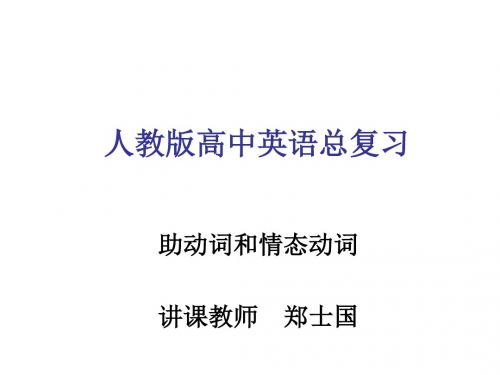
I shall write to you at the end of the month.
If you want a computer, you shall have one.
A player shall be sent off for using bad language. need
情态动词--明晰每一个情态动词的具体功能
4) 责任、义务,与should/ought含义类似:
You must see the film; it’s wonderful.
4. should /ought
1) 责任、义务
A. 指现在或将来:
The police should do something about it.
The machine ought to be cleaned once a week.
don’t.
助动词—时态和语态的承载者
3
4. will
1)表示将来,用于各个人称。
2)表示请求,用于第二人称的疑问形式:Will you have an apple?
5. would
1) 表示过去将来,用于各个人称。
2)表示婉转请求,用于第二人称的疑问形式:Would you help me?
1) must, may/might
2) shall/should, would, ought,
3) need, dare, have, used, be able, had better/had best
情态动词 准确把握句子的语气, 是正确使用情态动词的要点和难点。 无论是揣摩别人的语气,还是表达自己的语气,都需要清晰分辨语境中 情态动词的含义。
高中英语 语法复习十一 助动词与情态动词

语法复习十一:助动词与情态动词(一)助动词有be, have, do, will, shall。
它们本身没有词义,只和实义动词的一定形式构成复合谓语,用来表示时态和语态,构成否定、疑问及加强语气等。
1、be (am, is, are, were, been)(l)“be + -ing”构成进行时态;(2)“be + 过去分词”构成被动语态;(3)“be + 动词不定式”构成复合谓语:①表示按计划安排要发生的事。
The prime minister is to visit Japan next year. 总理将于明年访问日本。
②用于命令。
You're to do your homework before you watch TV.你得做完了作业才能看电视。
2、have (has, had)(1)“have+过去分词”构成完成时态。
如:Have you seen the film ? (2)“have been + -ing”构成完成进行时态。
如:What have you been doing these days? 这些日子你一直在干什么?3、do (does, did)(1)“do not + 动词原形”构成行为动词的否定式。
如:His brother doesn’t like playing basket.;(2)“Do + 主语 + 动词原形”构成行为动词的一般疑问句。
Does he go to school by bike every day? (3)“do + 动词原形”用于祈使句或陈述句中表示加强语气。
如:I did go to see him, but he wasn’t in我确实去看望他了,但他不在家。
Do do some work. 请一定做点什么;(4)代替前面刚出现的动词以避免重复。
My mother told me to go to bed early. So I did.4.will, shall (would, should)“will (shall+动词原形”构成一般将来时,一般来说shall用于第一人称,will用于第二人称或第三人称,口语中常用will代替shll,如:We will have a meeting to discuss the problem.(二)情态动词情态动词表示说话人对某一动作或状态的态度,可以表示“可能”、“可以”、“需要”、“必须”或“应当”等之意。
助动词与情态动词

3 用于加强语气,do, does和did位于陈述句的动词 原形前,do位于祈使句中的动词原形前。如:
Do have another cup of coffee before you go.
走前请一定再喝一杯咖啡。
如:
Never did I tell him about that.我从来没有告诉过 他那件事。
Rarely does it snow in the South.南方很少下雪。
情态动词can. may. must的用法
1. can的用法 2. could的用法 3. may的用法 4. might的用法 5. must的用法
May I ask you a question 我可以问你个问题吗 比Can I ask you a question
更礼貌
You may keep the book for two weeks. 这本书你可以借两周。 2 may表示可能性,常用于肯定句和否定句中,指
现在或将来的可能性。如: It may be true.那可能是真的。 The road may be blocked.这条路可能不通了。
You may as well stay where you are.你还是原地呆着好。 All the pubs are closing. We may as well go home. 所有的酒馆都打烊了。我们还是回家吧。
在对由may引出的“请求许可”的问句做出肯定回答时 了通常不用过于严肃和正式的Yes, you may. 而多用Yes, please 请便 或Of course/ Certainly 当然可以 ;否定回答 时,常用“Please don't 请不要 .”或“No, you mustn't 不行 .”
英语语法知识讲解:助动词和情态动词

英语语法知识讲解:助动词和情态动词
1.助动词:辅助其他动词构成时态、语态、疑问句式、否定名式的动词。
助动词有些词义,有些没有词义,或者暗含一点词义。
放在谓语首位置助动词会受主语人称、数的限制,其他位置不会受限制。
2.英语中有19个助动词:
do does did
shall will should would
have has had having
be am is are was were been being
3.情态动词:放在谓语动词的首位,辅助其他动词构成谓语,给谓语增加“可以,愿意,能够,应该,必须”等意思。
情态动词的性质、作用与助动词相同,除了给谓语增加一点意思外,还代替助动词与其他动词构成疑问句式和否定句式。
但它们没有人称、数的变化,并且只能用在谓语中,不能用于为以外的成分中。
4.英语的情诚动词有:
5.助动词和情态动词的对比:
本文作者:丹丹英语(公众号:英语语法学习)
英语语法知识讲解:助动词和情态动词1.助动词:辅助其他动词构成时态、语态、疑问句式、否定名式的动词。
助动词有些词义,有些没有词义,或者暗含一点词义。
放在谓语首位置助动词会受主语人称、数的限制,其他位置不会受限制。
2.英语中有19个助动词:do does did shall w 推荐度:点击下载文档文档为doc格式。
5.系动词助动词情态动词

系动词、助动词、情态动词一、情态动词(could):能够、可能、可以;may(might):可以、可能;must:必须; shall:将会;should:应该;will:将会,愿意;would:将会2.半情态动词(后接动原,但否定和疑问句要借助do):have to不得不,had better最好,used to过去常常3.情态动词无三单(have to除外);不能单独使用,后接动词原形共同构成谓语4. need既可做实义动词又可做情态动词(作实义动词,后接to do/doing,否定don’t need to do do/doing;作情态动词,后接动词原形,否定needn’t do)5.表推测:must be一定是(语气最肯定),can be可能是,may be也许是(语气最不肯定);can’t be 一定不是(语气最肯定,must be的否定形式)也许(副词,常用在句首);may be也许是(谓语动词,用在句中)与need开头的一般疑问句,肯定回答用must,否定回答用needn’t/don’t have to(不必).开头的一般疑问句,肯定回答用may/can,否定回答用can’t/mustn’t.二、系动词1.系动词后可接形容词。
2.表示状态的系动词be(am, is, are, was, were,been),keep ,stay,表示感觉的半系动词feel (摸起来,感觉), look (看起来), smell (闻起来), sound (听起来),taste(尝起来);三、助动词1.助动词本身无词义或意义不完整,必须和实义动词共同构成谓语。
2.常用的助动词:be(am, is, are, was, were,been,being)用于进行时态或被动语态;do(does,did)用于一般现在时或一般过去时的否定句和疑问句;have(has,had)用于完成时态;will,shall,would,should用于将来时态,shall/should只能用于第一人称。
助动词和情态动词、动词的时态

三.动词的时态
6. 过去完成时(had + done)表示
过去某个时间之前已经完成的动作,即 过去完成时的动作发生在“过去的过 去”,句中有明显的参照动作或时间状 语,这种时态从来不孤立使用 ( before, after, by, up till )(5题)
3.情态动词+完成式(have done)
C. should +完成式(have done) 表示“本应该做而实际上没有做某事”,其否定式表 示某种行为本不该发生却发生了。可以与ought to +不 定式完成式(have done)互换。 ( 6题)
You ought to / should have helped him. (but you didn’t.) D. needn’t +完成式(have done) 表示“本来不必做而实际上做了某事”。(20题) You needn’t have watered the flowers, for it is going to rain.
There had been 25 parks in our city up till 2000.
三.动词的时态
7. 一般将来时(will + do /be going to do)
表在将来某个时间会发生的动作或 情况。常和tomorrow, next year, in 2008等表示将来的时间状语连用, 其表现形式多达5种。Beijing will host the 29th Olympic Games in 2008.
且完成的动作,或过去习惯性动作,不强调对现 在的影响,只说明过去。(19题) He promised to buy me a computer if he got a raise.
高考英语助动词情态动词

3)表示婉转看法,用于第一、三称:
He would mind your going. I’d go there with you.
4) 表示过去习惯性动作或倾向:
When he was young, he would often walk here.
5) 用于虚拟语气
A. 条件句: I should be obliged if you wouldn’t George me.
2)may的过去式, 用于间接引语:
A. 表示“可以”: I thought you might stay here.
B. 表示“可能”: He said he might be late.\
C. 用于状语从句,表示目的、让步等:
I lent him $500 in order he might go for a holiday.
Cars must not park in front of the entrance. We mustn’t be
late.
情态动词--明晰每一个情态动词的具体功能
4
3) 推断。
A. 现在可能: He must know the answer.
B. 过去可能: We must have read the same report.
8 have 表示客观上的必要性,后接带to的不定式.
1) 肯定式:We have to be careful in such matters.
2) 否定式和疑问式:
You don’t have to get up early. Do you have to leave so soon?
成高辅导语法3-助动词、情态动词、非谓语动词
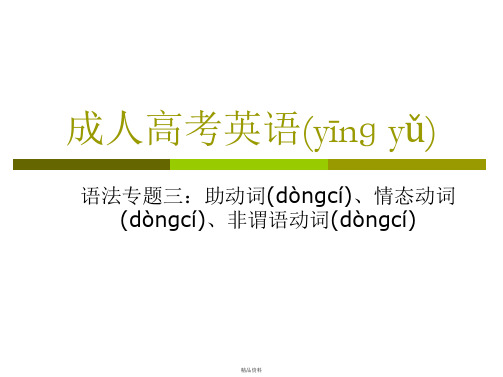
表示过去应该做某事而没做
精品资料
练 习: I was caught in a heavy rain. I __(_B_)__
1. —Where will you start your work after graduation, in the south or in the north?
— Mm, it’s not been decided yet. I __(_D_)__
continue my study for a higher degree.
— It _(_A_)_ be your younger brother. A. must B. shall C. will D. would
精品资料
例2:—Mom, do I have to go to bed now?
—Yes, you ___(D__). A. can B. will C. may D. must
意义: 情态动词时一种(yī zhǒnɡ)本身有一定词义,但
要与动词原形或其被动语态一起使用,给谓语动词 增添情态色彩,表示说话人对有关行为或事物的态 度和看法,认为其可能、应该或必要等。
精品资料
例1: — Who do you think has made my
room so dirty, mum?
-我应该把发生的事情(shì qing)告诉给班主任吗? -不行,你不能。李老师会非常生气
精品资料
3. Jim went to his hometown yesterday. He
中考英语 词汇与语法—助动词、情态动词素材
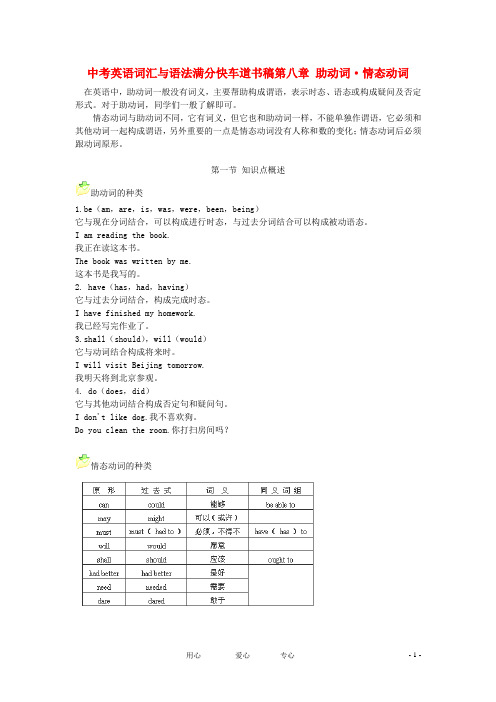
中考英语词汇与语法满分快车道书稿第八章助动词·情态动词在英语中,助动词一般没有词义,主要帮助构成谓语,表示时态、语态或构成疑问及否定形式。
对于助动词,同学们一般了解即可。
情态动词与助动词不同,它有词义,但它也和助动词一样,不能单独作谓语,它必须和其他动词一起构成谓语,另外重要的一点是情态动词没有人称和数的变化;情态动词后必须跟动词原形。
第一节知识点概述助动词的种类1.be(am,are,is,was,were,been,being)它与现在分词结合,可以构成进行时态,与过去分词结合可以构成被动语态。
I am reading the book.我正在读这本书。
The book was written by me.这本书是我写的。
2. have(has,had,having)它与过去分词结合,构成完成时态。
I have finished my homework.我已经写完作业了。
3.shall(should),will(would)它与动词结合构成将来时。
I will visit Beijing tomorrow.我明天将到北京参观。
4. do(does,did)它与其他动词结合构成否定句和疑问句。
I don't like dog.我不喜欢狗。
Do you clean the room.你打扫房间吗?情态动词的种类can,may,mustcan,may,must是三个最重要的情态动词,其基本句型如下:肯定句:主语+can,may,must +动词原形否定句:主语+can,may,must +not +动词原形疑问句:Can,May,Must +主语+动词原形?1. can,may,must的肯定句You may eat lunch,but you must wash your hands.你可以吃饭,但是你必须洗手。
(1)cana.表示能力;能,会She can run fast,but I can't.她很会跑,但是我不会。
小学英语语法详解动词(2)——助动词和情态动词

小学英语语法详解动词(2)——助动词和情态动词助动词和情态动词三、助动词助动词协助主要动词构成谓语动词词组,是语法功能词,自身没有词义,不可单独使用。
最常用的助动词有:be, have, do, will, shall, should等,它们表示不同的时态和语态。
其中be、do、have 是最基本的,它们没有词汇意义,只有语法作用,如协助构成进行体、完成体、被动态、否定句和疑问句等。
1.表示时态He is dancing.他在跳舞。
He has gone to London.他已去了伦敦。
2.表示语态The letter was sent to England.信被寄往英国。
The dog is lost.小狗被弄丢了。
3.用作构成疑问句Do you like coffee?你喜欢咖啡吗?Did you father have dinner with you?你父亲和你一起吃晚饭了吗?4.与否定副词not合用,构成否定句I don’t ike him.我不喜欢他。
He didn’t catch the bus.他没有赶上车。
5.加强语气In fact, I do weep a little.实际上,我的确哭了一会儿。
I do love you.我确实很爱你。
6. shall 和 will 的助动词用法1)shall 和 will 作为助动词可以与动词原形一起构成一般将来时I shall write a letter to my grandmother.我将给我的祖母写一封信。
He will go to Sydney.他要去悉尼。
2)shall 在疑问句中,用于第一人称比较多,用来征求对方意愿Shall I turn on the light?我可以把灯打开吗?Shall we go shopping?我们去购物好吗?四.情态动词情态动词本身有一定的词义,表示说话人对有关行为或事物的态度和看法,认为其可能、应该或必要等。
2020高考英语一轮复习语法第24讲:助动词和情态动词
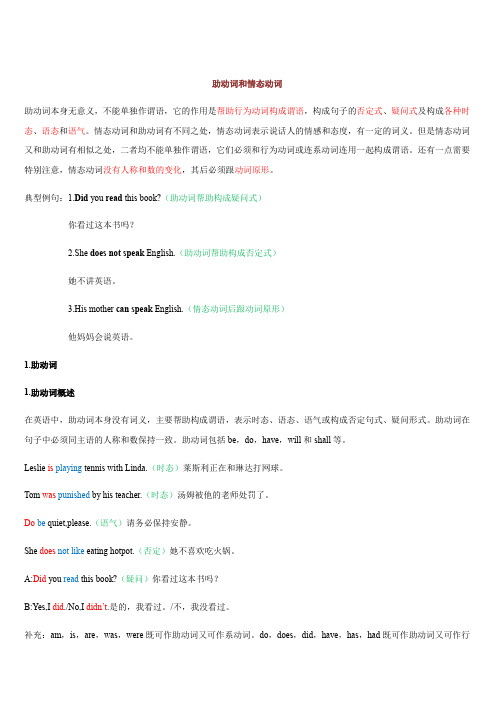
助动词和情态动词助动词本身无意义,不能单独作谓语,它的作用是帮助行为动词构成谓语,构成句子的否定式、疑问式及构成各种时态、语态和语气。
情态动词和助动词有不同之处,情态动词表示说话人的情感和态度,有一定的词义。
但是情态动词又和助动词有相似之处,二者均不能单独作谓语,它们必须和行为动词或连系动词连用一起构成谓语。
还有一点需要特别注意,情态动词没有人称和数的变化,其后必须跟动词原形。
典型例句:1.Did you read this book?(助动词帮助构成疑问式)你看过这本书吗?2.She does not speak English.(助动词帮助构成否定式)她不讲英语。
3.His mother can speak English.(情态动词后跟动词原形)他妈妈会说英语。
1.助动词1.助动词概述在英语中,助动词本身没有词义,主要帮助构成谓语,表示时态、语态、语气或构成否定句式、疑问形式。
助动词在句子中必须同主语的人称和数保持一致。
助动词包括be,do,have,will和shall等。
Leslie is playing tennis with Linda.(时态)莱斯利正在和琳达打网球。
Tom was punished by his teacher.(时态)汤姆被他的老师处罚了。
Do be quiet,please.(语气)请务必保持安静。
She does not like eating hotpot.(否定)她不喜欢吃火锅。
A:Did you read this book?(疑问)你看过这本书吗?B:Yes,I did./No,I didn’t.是的,我看过。
/不,我没看过。
补充:am,is,are,was,were既可作助动词又可作系动词。
do,does,did,have,has,had既可作助动词又可作行为动词。
She does not speak English.(助动词)她不讲英语。
She does her work carefully.(行为动词)她工作很仔细。
情态助动词
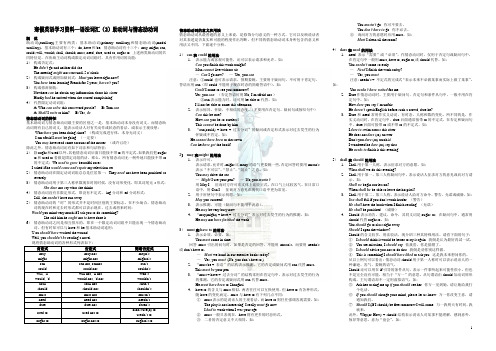
寒假英语学习资料—语法词汇(2)助动词与情态助动词概说助动词(auxiliary)主要有两类:基本助动词(primary auxiliary)和情态助动词(modal auxiliary)。
基本助动词有三个:do, have和be;情态助动词有十三个:may, might; can, could; will, would; shall, should; must, need, dare, used to, ought to. 上述两类助动词的共同特征是,在协助主动词构成限定动词词组时,具有作用词的功能:1)构成否定式:He didn’t go and neither did she.The meeting might not start until 5 o‟clock.2)构成疑问式或附加疑问式:Must you leave right now?Y ou have been learning French for 5 years, haven’t you?3)构成修辞倒装:Nowhere can he obtain any information about his sister.Hardly had he arrived when she started complaining.4)代替限定动词词组:A: Who can solve this crossword puzzle? B: Tom can.A: Shall I write to him? B: Y es, do.情态助动词的特征基本助动词与情态助动词最主要的区别之一是,基本助动词本身没有词义,而情态助动词则有自己的词义,能表示说话人对有关动作或状态的看法,或表示主观设想:What have you been doing since? (构成完成进行体,本身无词义)I am afraid I must be going. (一定要)Y ou may have read some account of the matter. (或许已经)除此之外,情态助动词还有如下词法和句法特征:1)除ought和used以外,其他情态动词后面只能接不带to的不定式。
第十四章助动词和情态动词(思维导图知识梳理好题精炼)2022-2023初中英语中考语法归纳

第十四章助动词和情态动词思维导图知识梳理一、助动词(一)概说助动词不能单独作谓语,本身没有词义,也不表示动作,只能和主要动词一起构成谓语,表示否定、疑问、时态、语态或其他语法关系.助动词的分类及其变化形式:(二)助动词的用法1.助动词be有八种形式(1)与现在分词构成各种进行时态以及与have和现在分词构成完成进行时态.You are working hard today.你们今天干得很努力.Is Su Ming working this week?本周苏明上班了吗?What have you been doing these days?这几天来你在干什么?(2)与过去分词构成被动语态.A new computer has been bought by the office.办公室已购买了一台新电脑.He was been invited to teach at a university there.他被邀请在那儿的一所大学任教.Such books are written for children.这种书是为儿童写的.(3)与形容词、名词、代词、从句等构成“系+表”结构.My job is very interesting and I like it very much. But sometimes it's boring.我的工作很有趣,我非常喜欢它,可有时候也令人烦.(4)与动词不定式构成谓语.The new text seems to be easy, but actually, it is rather difficult.这篇新课文好像很容易,其实相当难. These books are not to be taken out of the room.这些书不得带出室外.2.助动词have有五种形式(1)与过去分词构成各种完成时.We've known each other since 1987.我们从1987年起就互相熟悉了.He's been to Shanghai.他去过上海.We have not seen each other since I left Beijing.自从我离开北京,我们就没见过面.By the end of last month, we had studied English for two years.到上月底,我们已经学习了两年英语了.(2)和动词不定式连用构成谓语,表示因客观环境促使不得不做的事.The bus has left, and if we want to catch the train, we'll have to take a taxi.公交车开走了,假如想赶上那趟火车,我们不得不打的.点拨have还可用作实义动词,表示“有”“吃”等含义.Would you like to have some beer?你想喝点啤酒吗?We're having breakfast.我们正在吃早饭.3.助动词do有三种形式(1)构成一般现在时和一般过去时的疑问句.Do you know what they are talking about?你知道他们在谈论什么吗?What question did he ask you?他问你什么问题?(2)构成一般现在时和一般过去时的否定句.He doesn't want to go there, neither do they. 他不想去那儿,他们也不想.He didn't come to school last Monday.上星期一他没来上学.(3)代替前面刚出现的动词,以避免重复.-Do you learn English?你学习英语吗?-Yes, I do.是的,我学习英语.This material looks nice. So does that one.这料子看来很好.那种也很好.(4)用于加强语气,表示强调(多用于肯定式中).Do come and join us.一定要来参加我们的活动.I do think you are right.我的确认为你是对的.I do like you.我真的喜欢你.点拨do还可用作实义动词,表示“做、干”等含义.(1)They went out to do some shopping.他们外出买东西去了.(2)Would you please do me a favour?你愿帮我一个忙吗?4.助动词shall(过去式should)和will(过去式would)有下列几种形式(1)“shall/will+动词原形”,构成一般将来时,表示将来意义.shall用于单复数第一人称,will可用于所有人称.在今日英语中,shall常被will替代.Will you close the door, please?请关上门好吗?Shall I open the door? It's stuffy in the room.我打开门好吗?房间里很闷.When will Mike arrive here tomorrow?迈克明天什么时候到达这里?He will arrive here at three o'clock tomorrow.他明天三点钟到达这里.(2)“should/would+动词原形”,构成过去将来时.should作为“shall”的过去形式,用于单复数第一人称;would 作为“will”的过去式,可用于各人称.They said that they would finish it soon.他们说很快就要做完了.Did you ask Kate when they would return?你问没问凯特他们什么时候返回来?点拔will可表示某种倾向或习惯性动作The door won't shut.门关不上.Fish will die out of water.鱼离开水不能活.二、情态动词(一)概说情态动词表示说话人的语气和观点.情态动词有一定的词义,但不能单独作谓语,它必须和表示动作或状态的不带to的不定式(ought除外)连用,构成复合谓语.情态动词只有情态意义,即它表示说话人对动作的观点,如需要、可能、意愿或怀疑等.情态动词主要有:can(could),may(might),must, ought to, need, dare(dared), have to(had to).此外shall, will, should, would在一定场合下也可用作情态动词.(二)情态动词具有以下特征1.在形式上,情态动词没有实义动词的各种变化,只有could, would, had to, might, should等几个过去式.其他如must, ought to等的过去式皆与现在式同形,且在各种人称后都用同样的形式2.在意义上,大多数情态动词有多个意义.如can可表示“能够”“可能”“允许”等,may可表示“可能”“允许”“目的”“让步”等3.在用法上,情态动词(除ought跟不定式外)与助动词一样,须后接动词原形,而构成谓语动词(三)情态动词的用法1.can的用法(1)表示能力“会、能”等.The hall can hold at least 2000 people.这个大厅至少能容纳2000人.Can you drive a car?你会开车吗?点拨(1)can和be able to都可表示“能力”,意思上相同.但can只有现在式和过去式(could)两种形式,如需用其他时态,用be able to代替.He can still be alive.他可能还活着.He can't be poor.他不可能贫穷.He has not been able to finish the work in time.他没能及时完成工作.I'll be able to see you tomorrow,我明天将能去看你.(2)如果我们要表示一个动作成功地完成了,那么必须使用was able to,而不能用could.He was able to leave Europe before the war began.他设法在战前离开了欧洲.He was able to go to Paris yesterday and he enjoyed himself very much.他昨天设法去了巴黎,而且他玩得非常高兴.(3)在否定句中could与be able to两者意思一样.I could nor swim to the other side of the river.I wasn't able to swim to the other side of the river.我没能游到河的对岸去.(4)can/could不应与be able to同时使用.(2)表示“建议”或“请求”,可用can I...或can you...等结构,语气比较客气.Can I go swimming today, please, Mum?妈妈,我今天可以去游泳吗?Can I borrow your bike?我可以借你的自行车用一下吗?(3)表示惊异、怀疑、不相信等态度(主要用于否定句和疑问句).No, no, this can't be true.不,不,这不可能是真的.How can you be so careless?你怎么能这样粗心呢?(4)表示“允许”或“请求允许”,其意思相当于may(可以),但can比may用得更广泛,can不仅表示说话人同意、允许,还可表示客观条件的许可.may通常表示说话人的许可.No one can smoke in the office.在办公室里任何人都不能吸烟.That sort of thing can't go on like this.那样的事不能再这样继续下去.2.could的用法(1)could是can的过去式,表示过去有能力及过去存在的可能性.He couldn't go that day.那天他不可能去.(可能性)I could drive a car before I left school.毕业前我就会开车了.(能力)(2)用于现在时和将来时,代替can;表示更为客气、婉转地提出请求或陈述看法,有时则表示可能性不大.Could you tell me where I can change some money?你能告诉我在哪儿能换钱吗?Could you sign here please, Sir?先生,请在这儿签字好吗?3.may的用法(1)表示客气或委婉的请求时用may,回答时也用may就会显得冷淡、不客气,所以最好避之而改用热情、客气的答语.-May I come in?我可以进来吗?-Yes, please.可以,请进.-May I borrow your bicycle?我可以借用一下你的自行车吗?-Certainly.当然可以.(2)表示“可以”即表示说话人同意、许可,或在疑问句中,征询对方的许可.其否定式可用may not.但在表示“不可以”“不许”“禁止”“阻止”等意思时,常用must not(mustn't)代替may not.-May I take this book out of the reading-room?这本书我可以带出阅览室吗?-No, you mustn't.不可以.(3)表示可能.用来表示一件事或许会发生,或是某种情况可能会存在.通常只用于肯定或否定陈述句中,而不用于疑问句中.It may rain today.今天可能下雨.You may have another cake.你可以再吃一块蛋糕.She may not go to the concert tonight.今晚她可能不去听音乐会了.(4)表示祝愿.May you succeed!祝你成功!May all your dreams come true!愿你的理想都成为现实!4.might的用法(1)作为may的过去式,用来表示过去的“可能”和“允许”,多用于间接引语.He said that the news might be true.他说这消息可能是真的.She asked if she might have my bike.她问是否可以借用我的自行车.(2)代替may,表示可以做的事或可能发生的事.也可用于有礼貌地提出建议或请求,意为“可以”,在这种情况下,may和might无时间上的差别,只是更客气或更婉转些.They might have a lot of work to do.他们可能有很多事要做.Might I have a word with you?我可以同你说句话吗?5.must的用法(1)表示“必须”“应当”.用第一人称时,表示说话人认为有义务、有必要做某事.用第二、三人称时,表示说话人命令或要求别人做某事;在疑问句中,表示询问对方的意图.We must love our country.我们要爱国.I must take a day off tomorrow.我明天必须请假一天.Soldiers must obey orders.士兵必须服从命令.(2)must的否定式(mustn't)表示“不应该”“不许可”“不准”“禁止”等,语气比较强烈.You mustn't speak loudly in the library.不许在图书馆大声喧哗.We mustn't waste our time.我们不应该浪费我们的时间.点拨对must问句的否定回答,需要用;need not(needn't)不需要,或don't have to不必.-Must I do my homework now?我现在必须做作业吗?-Yes, you must.是的,你非做不可.-No, you needn't(need not)./don't have to.不,你不必现在做.(3)表示肯定的揣测(只用于肯定句):一定、准是、必定.The lady must be a doctor.那个女人一定是个医生.He hasn't come yet. He must be ill.他还没来,准是病了.Miss Gao must be in the office.高老师一定在办公室里.This must be Wang Hai's book.这一定是王海的书.点拨(1)表示现在对已发生过的事情的推测,一般用“must+have+过去分词”结构,意思是“想必是”“(过去)一定”.If you were at the party, you must have seen Mary.你如果参加了这次聚会,准保看见了玛丽.(2)表示对现在某个动作或即将发生的事情的推测,可以用“must be+ -in g”结构,意思是“一定”“准是”.You must be joking!你一定是在开玩笑!6.have to的用法(1)表示“不得不”“必须”的意思,与must在这个意思上很接近.must强调说话者的主观看法,意为“必须”;have to强调客观的需要,意为“不得不”.I missed the train, so I had to take a taxi.我误了火车,所以我得乘出租车.must仅用于表示现在和将来的义务,讲述过去,要用had to.I had to leave early because I wasn't feeling well.我不得不早点儿离开,因为我觉得不舒服.(2)have to也可用来表示“推测”,意思是“定是”“必定是”.She has to be(=must be) sick. She looks pale.她一定是生病了,脸色看来很苍白.点拨在口语中,可用have got to代替have to.Sorry I have got to go (=have to go) now.抱歉,我现在非走不可了.7.need的用法(1)need表示“需要”“必须”.作为情态动词主要用于否定句和疑问句,无时态、人称变化,后面跟动词原形.其否定式为:need not(needn't).You needn't try to explain.你不需要解释.She needn't come tomorrow.她明天不必来.点拨needn't后面跟“have+过去分词”结构,表示“过去已做了(但)没有必要做的事情”.The question needn't have been discussed.此问题本来不需讨论的.(2)need用作及物动词,主要用于肯定句,有人称、时态和数的变化,后接带to的不定式.其否定形式要借助于don't, doesn't或didn't;疑问形式要借助于do, does或did.He needs to know it.他需要知道这件事.Do you need any help?你需要帮助吗?I don't need things like that.我不需要那样的东西.8.dare的用法dare作为情态动词,主要用于否定句和疑问句,表示“敢于”,本身无变化(各人称都用dare),后面跟不带to的不定式,过去时用dared,其否定式为:dare not/daren't,dared not.How dare they do such a thing?他们怎么敢做出这样的事?Dare he say so?他敢这样说吗?She knows he was wrong but she daren't tell him.她知道他错了,却不敢告诉他.点拨dare用作及物动词的时候更多一些.这时dare后可以跟动词不定式,用于各种结构中.Do I dare to ask her?我敢问她吗?He didn't dare to go.他不敢去.She did not dare to tell them the truth.她不敢对他们说真话.9.ought to表示“应该”做某事,常可与should互换.You ought to be punctual.你应该守时.Students ought not to be late for class.学生上课不应该迟到.Ought we to answer this question now?我们应当现在就回答这个问题吗?点拨ought to后面跟“have+过去分词”结构,表示对过去该做而未做之事的责难、后悔或遗憾的心情.You ought to have helped her.你本该帮助她的.(却没有帮助她)He ought to have returned these books to the library last week.他上星期就应该把这些书还给图书馆.(却没有还书)10.shall的用法(1)shall作为情态动词,用于陈述句的第二、三人称,表示说话人的强烈意愿和决心,有“允诺”“警告”“命令”等含义,意思是“必须”.You shall come whenever you are wanted.什么时候叫你就要什么时候到.(强制)You shall not leave your post.你不得离开岗位.(警告)He shall get the answer tomorrow.他明天可以得到答复.(允诺)(2)shall作为情态动词,在疑问句中可用于第一、三人称,表示征询对方意见或请求,意思是“要不要”“好不好”.Shall he come to see you?要不要他来看你?Shall we go for walk?我们去散散步好吗?Shall I turn on the light?我要开灯吗?11.will的用法(1)表示“意志”“意愿”,可用于多种人称.He'll help you if you ask him.如果你请他帮忙,他是愿意帮忙的.Will you give him a message when you see him?见到他时,请你通知他一下好吗?(2)will还可用来表示一种习惯性动作或状态,有“总是”“惯于”等意思.Fish will die out of water.鱼儿离开水会死去.He will talk for hours if you give him the chance.如果你给他机会,他会滔滔不绝地谈上几个钟头.12.should的用法(1)表示“义务或责任”,意思是“应该”.I should speak and write English every day.我应该天天说、写英语.We should learn from each other and help each other.我们应该互相学习,互相帮助.(2)表示推测、预期.They should be here by now.他们现在该到了.Tom should know her address.估计汤姆知道她的住址.(3)should后面跟“have+过去分词”结构,其肯定句,表示过去应该做而未做的事,其否定句则表示过去不该做但做了的事情.He looks very tired. He should have had a good rest at home.他看上去很累了,本应该待在家里好好休息.As an adult, he shouldn't have misunderstood it.作为成人,他本来就不应该误解这件事.13.would(1)would作为情态动词will的过去式,表示过去时间的“意志”“愿望”或“决心”等,可用于各人称.I said I would do anything for him.我说过,我愿意为他做任何事.He said he would get up earlier the next morning.他说第二天早上要早点起床.(2)would可用来表示人的意愿、个人想法.在疑问句中用于第二人称,表示有礼貌、较婉转的请求.如:Would you like to have a glass of tea?你要喝一杯茶吗?Would you mind closing the door?请关上门好吗?I would like to buy a silk scarf for my wife.我想给妻子买一条丝巾.(3)would与动词连用,可表示过去反复发生的动作,相当于汉语中的“常常”“总是”等意思.如:The old retired worker would often go to the park to play chess.这位退休老工人常常到公园去下棋.When I was a student, I would take a walk along the country road after class.当学生时,放学后我常常沿着乡间小路散步.好题精练一、用适当的助动词和情态动词填空1.His father_________ not a lawyer.2.He_________ two sisters and a brother.3.I_________ never met him before I heard his speech.4.The visitors_________ given a warm welcome.5.Excuse me, _________ I have a look at the photo?6. _________ you work out(算出)this difficult problem without any help?7.This is a reading room. You_________ sing here.8. _________ I speak to the headmaster, please?9. _________ you like a sandwich?10.I_________ love a cup of tea.11.You_________ not drink and drive.12.We_________ buy a new lock for the front door.13.You_________ to knock at door before you come in.14.He_________ to pass an examination before he can start work.15. _________ you guess the answer? Sorry, I can't.16.May I come in? No, you_________.17.Your father is free now. You_________ ask him to tell you a story.18. _________ we hand in the exercises today?No, you needn't. You_________ hand them tomorrow.答案:1.is2.has3.had4.are5.may6.Can7.mustn't8.Could9.Would 10.would11.should 12.should 13.have 14.has 15.Can16.mustn't 17.may 18.Must,may二、选择填空1.-What_________ it be?-It_________ be a mail box, for it is moving. It_________ be a car.A. can; can't; mustB. can; can; mustC. can; mustn't; mustD. must; mustn't; can2.My mother is out. I_________ look after my little brother.A. have toB. canC. has toD. may not3.At that time she_________ sit here like that for hours.A. willB. wouldC. had toD. shall4.The radio says it is sunny today. You_________ take a raincoat with you.A. can'tB. needn'tC. mustn'tD. can5.I_________ like Chinese tea with nothing in it.A. wouldB. mustC. needD. can't6.- _________ we go out for a walk?-Good idea. What time shall we meet?A. ShallB. LetC. WillD. Must7.He_________ to go there when he was young.A. usedn'tB. didn't useC. is usedD. both A and B8.-Must we finish our homework now, Mrs. Read?-Oh no, you_________.A. mustn'tB. can'tC. won'tD. needn't9.These useful dictionaries_________ good care of.A. must takeB. must be takeC. must be takenD. must to take10.Don't be late again. You_________ be here on time.A. mustB. canC. mayD. needn't11.Tom,don't worry, you_________ get the book next morning.A. shallB. willC. mayD. can12. _________ you swim in the river?A. CanB. MustC. MayD. Need13.Chinese must have the largest number of speakers, _________?A. mustn't theyB. haven't theyC. don't theyD. doesn't it14.You did not go to the party yesterday, or I_________ you.A. would seeB. could meetC. might have seenD. might see15.-Is the boy by the window your brother?-It_________ him.A. maybeB. may beC. would beD. need be16.What_________ you like for breakfast?A. mayB. willC. wouldD. can17.- _________ you like some drink?-Yes, please.A. WouldB. WillC. CouldD. Can18.-May I throw a frisbee in the street?-No, you_________.A. may not B .mustn't C. needn't D. don't19.-Can you mend a TV set?-No, I_________.A. mustn'tB. can'tC. may notD. needn't20.-Please don't make a noise.-_________.I'll be as quiet as a mouse.A. Yes, I won'tB. No, I won'tC. No, I willD. Yes, I will21.The traffic_________ stop when lights are red.A. mustB. mayC. canD. mustn't22.- _________ I ask you a question, please?-Yes, please.A. MayB. MustC. NeedD. Will23.Go and ask Mr. Wu. He_________ tell you1 how to use the dictionary.A. mayB. shouldC. wouldD. could24. _________ you please tell me the way to the station?A. ShallB. WouldC. MayD. Might25. _________ I open the window? It's hot here.A. MustB. WillC. ShallD. Would 答案:1-5AABBA 6-10ADDCA11-15 BADCB 16-20 CABBB21-25 AAABC。
英语复习:助动词情态动词归纳
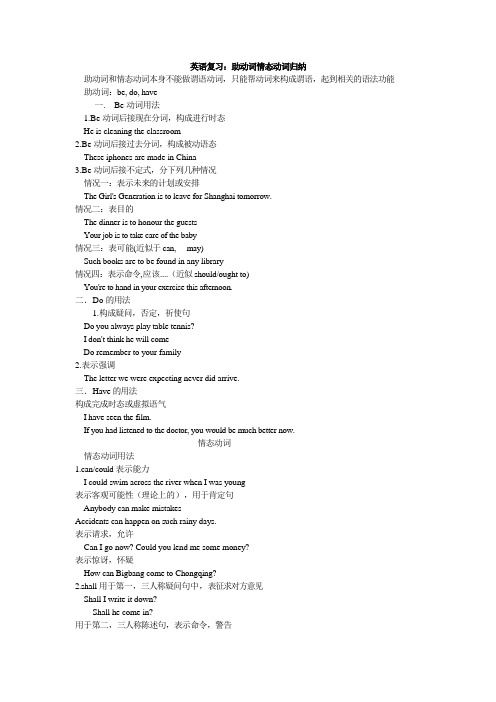
英语复习:助动词情态动词归纳助动词和情态动词本身不能做谓语动词,只能帮动词来构成谓语,起到相关的语法功能助动词:be, do, have一.Be 动词用法1.Be 动词后接现在分词,构成进行时态He is cleaning the classroom2.Be 动词后接过去分词,构成被动语态These iphones are made in China3.Be 动词后接不定式,分下列几种情况情况一:表示未来的计划或安排The Girl's Generation is to leave for Shanghai tomorrow.情况二:表目的The dinner is to honour the guestsYour job is to take care of the baby情况三:表可能(近似于can, may)Such books are to be found in any library情况四:表示命令,应该....(近似should/ought to)You're to hand in your exercise this afternoon.二.Do 的用法1.构成疑问,否定,祈使句Do you always play table tennis?I don't think he will comeDo remember to your family2.表示强调The letter we were expecting never did arrive.三.Have 的用法构成完成时态或虚拟语气I have seen the film.If you had listened to the doctor, you would be much better now.情态动词情态动词用法1.can/could 表示能力I could swim across the river when I was young表示客观可能性(理论上的),用于肯定句Anybody can make mistakesAccidents can happen on such rainy days.表示请求,允许Can I go now? Could you lend me some money?表示惊讶,怀疑How can Bigbang come to Chongqing?2.shall 用于第一,三人称疑问句中,表征求对方意见Shall I write it down?Shall he come in?用于第二,三人称陈述句,表示命令,警告You shall never see Allen Su's concert unless you can sing his song. should表示建议,劝告或推测,当“应该”讲Lie to ME should be a good serial We should strict with ourselves.ought to 和should 一样表示应该,可能性还要更大Human ought to stop polluting nature Studying oughtn't to occupy all of your spare time3. will/would 表示意志或愿望I will never do that again表示请示,建议Would/will you please tell me the way to the CSC?表示经常,习惯性动作Fish will die without water表示预料或猜想It will be about ten minutes' way to get CSC4.may/might 表示允许许可,否定回答时,用mustn'tMay I watch TV after supper?Yes, you may. / No, you mustn't表示推测,否定时没有mightn't 说法,5. 区分may not/ can not 用法It may be a trick.He may not come todayIt can't be our headteacherMay 在祈使句表祝愿May you success.May you have a happy life6.must 必须,强调主观,用于非常肯定的推测You must come to school on timeJustin Biber must be famous in European contrieshave to 必须,不得不,客观I have to go now, and it's already 12:00ed to 过去常常... 现在没有I used to be the fan of HejieHe didn't use to go to work by bike8.had better 最好,接动词原形,否定为had better notYou'd better talk so loudly.What had we better do next?9.would rather 宁愿,接动词原形I would rather dance with Micheal10.need 情态动词,用于否定,疑问句中,需要,必要You needn't ask me the questionNeed I finish the work before ten? Yes, you must.实意动词,need to doneed to be done=need doingI need to go to Beijing to attend an important meeting.The windows need to be cleaned/ cleaningWe don't need to watch this film11.dare 情态动词,敢,用于否定,有过去式dared,I dare say, 固定短语。
英语助动词,情态动词,系动词

1)should 无词义,只是 shall 的过去形式,与动词原形构成过去将来时, 只用于第一人称,例如:
I telephoned him yesterday to ask what I should do next week. 我昨天给他打电话,问他我下周干什么。 比较: "What shall I do next week?" I asked. "我下周干什么?"我问道。(可以说,shall 变成直接引语时,变成了 should。) 2) would 也无词义,是 will 的过去形式,与动词原形构成过去将来时, 用于第二、第三人称,例如: He said he would come. 他说他要来。 比较: "I will go," he said. 他说:"我要去那儿。" 变成间接引语,就成了: He said he would come. 原来的 will 变成 would,go 变成了 come.。过去式从原来的 go 变为 came。
be 动词
be 动词的意思 be 动词的用法 例句对照
be 动词的意思
be 动词意思和用法很多,一般的意思是:是,此种用法,有多种变化形式, is,am,are,was,were,being,been,to be.另外,be 动词还有成为的意思。 根据句子中不同的人称、数和时态,应该选择相应的 be 动词。
shall I turn on the light? 要开灯吗?( 我把灯打开好吗?) shall he come to see you? 他要不要来看你 (比较: will he come to see you? 他会不会来看你) shall 用在陈述句, 与第二第三人称连用, 变为情态动词 表示允诺,命令, 警告,和说话人的决心等。
- 1、下载文档前请自行甄别文档内容的完整性,平台不提供额外的编辑、内容补充、找答案等附加服务。
- 2、"仅部分预览"的文档,不可在线预览部分如存在完整性等问题,可反馈申请退款(可完整预览的文档不适用该条件!)。
- 3、如文档侵犯您的权益,请联系客服反馈,我们会尽快为您处理(人工客服工作时间:9:00-18:30)。
英语语法:助动词、情态动词五.助动词和情态动词A.助动词:没有独立的词义,不能单独构成谓语,往往有形式变化:be (am, is, are, was, were, being, been), have (has, had, having), do (does, did), shall, will (should, would).1.构成一般现在时与一般过去时以外的各种时态;2.构成被动语态;3.构成否定句和疑问句;4.加强语气;5.替代,以避免重复;6。
构成虚拟语气。
5) I th ought she’d come, but she didn’t (=didn’t come).B.情态动词:有一定的词义,没有人称和数的变化,不能单独构成谓语,后接动词原形:can, could, may, might, will, shall, would, should, must, need, ought to, dare等。
1.can/ could:1)表能力;2)许可;3)可能性;4)推测(通常用于否定句或疑问句)1) She can drive, but she can’t ride a bike. My son could (=was able to) read and write when he was four. 但:He was able to pass his examination as a result of his hard study. (设法或成功做了某事)2) Students can’t smoke in t he classroom. I could borrow my father’s car whenever I liked.3) Even experienced teachers can make mistakes. (理论上的可能性)Our club finances may be improved. It could be better to stay here. (实际上的可能性)4) The story can’t be true. (现在或未来情况) He couldn’t have said such a thing. (过去情况) 2.may/ might:1)可能性、推测;2)许可(否定:may not, m ustn’t);3)委婉的责备、不满;4)目的、让步状语从句;5)固定搭配:may (might) as well, may well;6)表祝愿(倒装)1) They might have known the matter earlier. (过去的推测)I think it might rain. It may snow tomorrow. He may be having the meeting now. (现在或未来的推测)2) You may use my dictionary. My boss told me I might havea vacation.3) You might have told the truth. (对照虚拟语气中的类似句式)4) They moved over a little so that I might sit down. Whatever he might say, no one believed him,.6) May you have merry Christmas!3.must:1)义务(否定:need n’t);2)不允许(否定句中);3)推测1) — Must I wash the dishes at once? — Yes, you must. / No, you needn’t.2) You must not speak ill of others.3) It must rain soon. He must be having the meeting now. (对现在或未来进行“肯定”猜测)No one answered the phone bell. They must have gone out. (对过去已发生的情况进行“肯定”猜测)4.need:1)需要;2)needn’t have + 过去分词(过去做了不必要做的事情);3)实义动词1) You needn’t work so hard.You need not meet him unless you’d like to.2) You needn’t have bought the dress. 3) You don’t nee d to come if you feel sick.5。
dare:1)敢;2)实义动词1) Mary dare not touch the snake. 2) I have never dared to tell him about it.6.will/ would:1)时态的区别;2)语气的区别1) I will marry you whatever happens. His father was angrybecause he wouldn’t obey him.2) Will you pass me the salt, please? Would you like to come and join us at the party?7.shall/ should/ ought to:1)第一、三人称疑问句,表示征求同意;2)第二、三人才陈述句,表示义务、命令,许诺;3)should/ ought to +动词原形:义务;4)should/ ought to +现在完成式,表责备、后悔(该做而没做的事)1) Shall I fetch a doctor for you? Shall he come at once?2) You shall do as you see me do. They shall never interfere in my private affairs again.3) You don’t look well. You ought to go to see the doctor. You should apologize to him.4) He shouldn’t have said such a thing. You ought to have worked harde r.8.would (会), should (应该), might (可能), ought to (应该) 用于虚拟语气(参见“虚拟语气”部分)1. Not until the game had begun ________ at the sports ground. (2000.6)A. had he arrivedB. did he arriveC. would he have arrivedD. should he have arrived2. Investigators agreed that passengers on the airliner _______ at the very moment of the crash. (2002.6)A. should have diedB. must have diedC. must be dyingD. ought to die3. The careless man received a ticket for speeding. He _______ have driven so fast. (2002.12)A. can’tB. wouldn’tC. shouldn’tD. mustn’t4. While crossing the mountain area, all the men carried guns lest they ____ by wild animals. (2002.12)A. should be attackedB. had been attackedC. must be attackedD. would be attacked5. He said that the driver must have had an accident; otherwise he ________ by then. (2002.12)A. would have arrivedB. should arriveC. must have arrivedD. would arrive6. The boy spent as much time watching TV as he ________ studying. (2002.1)A. doesB. hadC. wasD. did7. Things might have been much worse if the mother ________ on her right to keep the baby. (2002.1)A. has been insistingB. had insistedC. would insistD. insisted8. By the time you get New York, I _________ for London. (2002.1)A. would be leavingB. am leavingC. have already leftD. shall have left9. The article suggests that when a person ______ under unusual stress he should be especially careful to have a well-balanced diet. (2002.1)A. isB. wereC. beD. was10. By the time he arrives in Beijing, we ________ here for two days. (2001.6)A. have been stayingB. have stayedC. shall stayD. will have stayed11. You _________ him so closely; you should have kept your distance. (2000.6)A. sh ouldn’t followB. couldn’t have been followingC. mustn’t fol lowD. shouldn’t have been following12. Some woman _______ a good salary in a job instead of staying home, but they decided not to work for thesake of the family. (2000.1)A. must makeB. should have madeC. would makeD. could have made13. As Commander-in-Chief of the armed forces, I have directed that all measure ________ for our defense.(1999.6)A. had been takenB. would be takenC. be takenD. to be taken14. I have often ________ that you country is very beautiful.A. heard to tellB. heard to be toldC. heard to have toldD. heard tell15. With all this work on hand, he ________ to the cinema last night.A. mustn’t goB. wouldn’t goC. oughtn’t toD. shouldn’t have gone16. You ______ all these calculations! We have a computer to do that sort of thing.A. needn’t have doneB. must not have doneC. shouldn’t have doneD. cannot have done17. Mr. Brown was concerned that his unpopular political position _______ a disastrous effect on his career.A. could beB. might haveC. have beenD. shall be18. He _________ at the party but I didn’t notice him there.A. must have beenB. may have beenC. would have beenD. must be19. This box is too heavy. _________ give me a hand? (1998.1)A. would you mindB. would you pleaseC. will you like toD. will you please to20. As teacher we should concern ourselves with what is said, not what we think _______. (1997.6)A. ought to be saidB. must sayC. have to be saidD. need to say21. Once environmental damage ________, it takes many years for the system to recover. (1997.6)A. has doneB. is to doC. doesD. is done。
